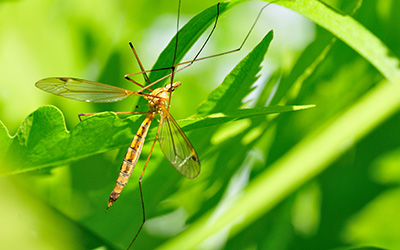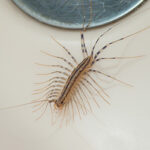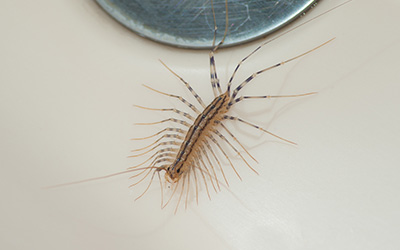
One of summer’s most notorious pests are mosquitoes. They can quickly ruin any summer gathering, leaving you and your guests itching for days after encountering this bloodsucking pest. Before you grab your bug spray or light your citronella candles, knowing what pest you are battling is important: Is it a crane fly or mosquito? Learn to differentiate between the harmless crane fly and the relentless, biting mosquito with our expert guide.
Mosquito vs. Crane Fly – How To Spot The Differences
Crane flies and mosquitoes share many similarities, but knowing a few key differences between the two will quickly turn you into an expert insect identifier.
- Physical Characteristics – The easiest way to tell the difference between a mosquito and a crane fly is size. Crane flies can grow to a massive 1 to 2 inches long, earning them the nickname mosquito hawk. Mature mosquitoes grow to be less than half that size, measuring under 1/2”. Another difference between these two pests is the shape of their body. Mosquitoes are known for their curved back, whereas crane flies have straight bodies.
- Diet – The diet of crane flies and mosquitoes is vastly different. Crane flies eat a varied diet of vegetation, roots, algae, and insects. A mosquito’s diet is based on gender; male mosquitoes feed on nectar and pollen, while female mosquitoes require blood from humans or animals to reproduce.
- Habitat – Mosquitoes and crane flies share a similar habitat. They both seek out areas with stagnant water to lay their eggs. Once fully mature, a crane fly generally stays in the same area, buzzing around bodies of water and tall grass. While mosquitoes start out close to standing water, female mosquitoes often travel away from nesting sites in search of humans or animals to feed on to produce eggs.
- Risk – Mosquitoes are known for their itchy bites, transmitting diseases like Zika, West Nile Virus, and Yellow Fever. Crane flies lack a long proboscis, the sharp, needle-like mouthpiece mosquitoes use to pierce skin, and do not have the jaw strength to bite humans even if they wanted to try to bite. Although similar in appearance to mosquitoes, crane flies are completely harmless.
Keep Buzzing Pests Away With Leo’s Pest Control
Whether it is a massive crane fly or a biting mosquito, the presence of these pests can ruin your lovely summer evenings outdoors. With help from the pest control experts at Leo’s Pest Control, you can stop swatting bugs and get back to enjoying your backyard.
For over 55 years, Leo’s Pest Control has been a leader in fast, effective, and lasting pest control services in the Bristol, Tennessee, area. Our licensed exterminators are dedicated to exceptional service, allowing you to reclaim your space from pests. Bid farewell to pest-related woes and contact Leo’s Pest Control today!
Crane Fly or Mosquito? A Case of Mistaken Identities in Bristol TN
Serving Tennessee & Virginia





